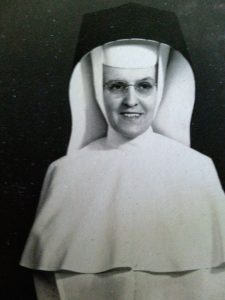
The most beautiful eulogy I ever heard was also the shortest. It was spoken about 20 years ago and was for my great aunt, who devoted her life to being God’s servant. She was a nun, and what one of her fellow sisters said about Sister Benigna summarizes an existence we would all love to have lived by the end of ours on this earth:
“She lived her life as a prayer.”
Such a life isn’t just a religious calling. All people who devote their lives to public and private service are speaking God’s language, whether they know it or not. You don’t take on law enforcement, fire-fighting, nursing or any role devoted to serving fellow human beings because you want to become a millionaire. And taking care of an elderly or ill loved one has many costs. You choose to budget your life in a way that makes the biggest difference in others’ lives.
All three readings from this Sunday’s mass offer different takes on servanthood. Each also demonstrates a unique approach to prayer.
Our first reading (Gn 18:1-10a) has Abraham, our Father in faith, responding to the call of our heavenly Father who takes the form of three strange neighbors who show up at his home. In accord with the call to love your neighbor as you love your God, Abraham begs the three visitors to take a break from the heat of the day for a little shelter and refreshment. He calls to his wife Sarah and his servants to join him in a prayer of action:
“Quick, three measures of fine flour! Knead it and make rolls.” He ran to the herd, picked out a tender, choice steer, and gave it to a servant, who quickly prepared it. Then Abraham got some curds and milk, as well as the steer that had been prepared, and set these before the three men; and he waited on them under the tree while they ate. Here’s how God answered this prayer:
“I will surely return to you about this time next year, and Sarah will then have a son.”
Abraham’s prayer offering up his hospitality and shelter was a close encounter—filled with the same passion many of us feel when visiting a chapel for the kind of one-on-three experience Abraham enjoyed here with God. This passage from Genesis precedes an even more urgent prayer by which Abraham asks God to spare the sinful citizens of Sodom from imminent judgment. Abraham issues a series of persistent prayers: “Would you save the city for the sake of 50 righteous people? 40? 30? 20? 10?” Yes, even for the sake of ten.
Our second reading (Col 1:24-28) has Paul seeking some hospitality from the Church of Colossae for God the Son. His letter to the Colossians is a public prayer seeking the shelter of their heart for the salvation of their soul:
Now [the Word] has been manifested to his holy ones, to whom God chose to make known the riches of the glory of this mystery among the Gentiles; it is Christ in you, the hope for glory. It is he whom we proclaim, admonishing everyone and teaching everyone with all wisdom, that we may present everyone perfect in Christ.
Sunday’s gospel reading (Lk 10:38-42) offers an example of the most important form of prayer, without which all other forms are worthless. It is demonstrated by Jesus’ friend Mary—who along with her sister, Martha, are offering their own versions of hospitality to their teacher. Martha is doing all she can to make this visit one that Martha Stewart would be proud of. She is also exhibiting the Type-A attitude Martha the latter became famous for:
“Lord, do you not care that my sister has left me by myself to do the serving? Tell her to help me.”
Jesus answers this rather shrill prayer by noting Mary’s different kind of prayer:
“Martha, Martha, you are anxious and worried about many things. There is need of only one thing. Mary has chosen the better part and it will not be taken from her.”
In other words, “Be quiet and listen!”
Listening to discern God’s will is a silent form of prayer that shapes the active form of prayer we give back to God the Father through His Son, as present in each human being we encounter. The result of those prayers is a life well prayed through God the Spirit.
–Tom Andel